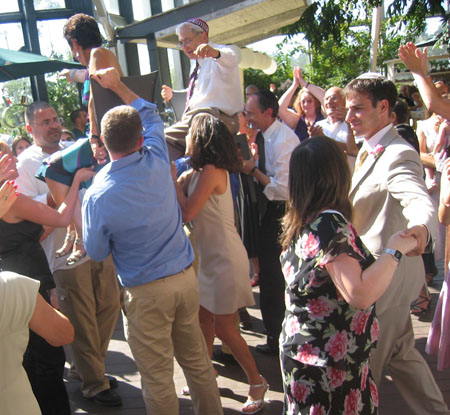|
|
|
wedding in the Holy Land
Friday, September 30 2005
setting: 80 Hayarkon Street (near the US Embassy), coastal Tel Aviv, Isræl
In Isræl there are, broadly, two kinds of collective agricultural communities, both rooted in the nation's socialist [re]genesis. One is the well-known kibbutz, where all things are communally-owned, even (in the most extreme examples) thoughts and opinions. It's the Marxist notion of "To each according to his need, from each according to his ability" writ small. At this scale, communism is a highly-effective system and the kibbutz has been a strong engine of production and innovation throughout the tiny arid country. The other form of collective agricultural community is the moshav, which is less socialist, allowing people to own their own homes, fields, and other possessions and to also keep their opinions to themselves if they so choose.
The wedding today of Dina and Gilad would be taking place at a moshav some distance north of Tel Aviv, and I rode there in a convoy with other wedding attendees from my hotel (one that did not include Gretchen, who got up early with Dina to help her fix her hair). Gretchen's father was doing the best defensive driving he could in the compressed awfulness of Isræli traffic. Isræli drivers are both ruthless and distracted, one hand waving a cigarette, another pressing a cell phone to an ear, and somehow two more for the gear shift and steering wheel. This attitude would make for constant traffic accidents if it weren't streaked with a kind of frontier altruism. Isrælis will happily let you into the four-foot-long gap in front of them if you show you have the balls to take it. And if you're lost, broken down in the desert, or just in need of a cigarette, help is on the way.
At some point another motorist motioned that something was wrong with our car (a rental), so I jumped out and quickly noted that someone had stolen one of the front turning signal light assemblies. This had probably happened in the parking garage last night. Security tends to be high in Isræl, with electronic-wand-weilding guards posted at the entrance to restaurants to keep Palestinian suicide bombers away, but perhaps less attention gets paid to property crimes taking place in the unpeopled dead of night.
The weather at the moshav was Southern California perfect and the 200 guests milled around on a lawn adjacent to a swampy sea-level canal before the ceremony. Conforming to an observable pattern, the food was varied, delicious and (this time) fully kosher, not that I cared about that last one.
I think of non-secular states as problematic anachronisms, but it's fair to say that Isræl has two arguments in its favor: firstly, that it is the only Jewish state and secondly, that Jewish identity is not just religious but is also ethnic, and serves an important secular cultural purpose. As a nation struggling to preserve, extend, and consolidate its identity as a Jewish state, it has taken a number of completely unprecedented steps, the most remarkable of which is the resurrection of Hebrew from its status as a lifeless liturgical language and making it into the first language of several generations of its inhabitants.
Functionally, Isræl is a mostly secular state, but it indulges its ultra-orthodox religious minority as a cultural bulwark and repository of distilled ethnic identity. The religious are exempted from military obligations, are forgiven for not paying taxes, and are permitted to build whole villages in the Palestinian West Bank despite Isræli and international law, further exacerbating the conflict with the Arabs.
The ultra-orthodox also wield control over matters of family law. For this reason, Dina and Gilad's marriage had to be done according to orthodox protocols and an orthodox rabbi had to officiate. This is true whenever two Jews marry inside Isræl and is the reason so many Isrælis go offshore to nearby Cyprus for their weddings. But there is a certain amount of wiggle-room even in a proper Isræli wedding. Today, for example, there were two rabbis under the chuppah, and only one of them was orthodox and he was mostly there to meet the legal requirement.
Still, state-enforced religious requirements forced a number of medieval restrictions on the ceremony, the most galling of which (for Gretchen) was the requirement that only men be allowed to sign the ketubah or otherwise play an active role in the ceremony. Clearly, this was the perpetuation of a tradition where the wife was a commodity being exchanged between families.
Dina's brother, being a man, had official duties under the chuppah, and he'd given me his video camera. So I spent most of the wedding filming what I could see of it between the wooden rails of the marriage stage, which was a pier constructed in the moshav's swampy arm of the sea. At some point my attention (and that of the children in attendance) was drawn to the water, where three-foot long whiskered fish were leisurely surfacing and submerging. There was also more advanced creatures present with real looks of curiosity in their eyes. At first people thought these things were seals, but then we saw their bodies were tucked inside two and a half foot wide circular shells. They were sea turtles, an auspicious sign for any wedding, all agreed.
At some point during the ceremony someone in the audience collapsed and a voice rang out, "Is there a doctor?" It being a Jewish wedding, the purpose of this query was more to raise an alarm than to ask a question whose answer was already known to all.
The meal, which was conducted as a huge multi-station buffet in a semi-outdoor space, began immediately after the ceremony, ensuring everyone had a full stomach for the dancing of the hora. As usual, I was one of the strong guys whose job it was to hold chair dancers aloft. Though the wedding itself had conformed generally to the letter of orthodox procedure, by now the norms of post-Haskalah Judaism were in effect, and men and women were dancing together (causing at least one ultra-orthodox woman in attendance to leave early).
Unlike most weddings I've attended, a DJ never played any role in the music. All of it was performed (or partially-performed) by a band that could play just about anything east of Led Zeppelin. According to Gretchen, the band's members were all ultra-orthodox.
Two different bars had been provided, one serving alcoholic drinks and the other fixing drinks containing caffeine. I spent most of the post-wedding going back and forth between wine and cappuccinos.
After we returned to our hotel in Tel Aviv, Gretchen and I walked down to the beach and waded out into the Mediterranean, the first time I'd ever ventured into it. It was warm and unusually salty and, because this was the west end of a big sea aligned with the prevailing westerlies, the waves were as big as the ones I'd remembered in San Diego, but it was much more fun to be in water that wasn't 58 degrees. I wished I'd had a boogieboard.
With each succeeding wave, Gretchen and I grew giddier and giddier, and from then on, with the approach of every wave, we'd shout, "Oh fuck! We are so fucked!" as if a tsunami were about to hit.
Later a bunch of us walked all around the neighborhood looking for a restaurant willing to be open on shabbat (which had begun at sundown). The only places we found were humble pizza houses, which Gretchen snubbed with, "I can get bad pizza anywhere!" So we ended up at the only nice non-kosher restaurant in the area, right across the street from our hotel.
Later the younger of us, those who had never reproduced, convened at a bar down south closer to Yaffo for an informal event with the bride and groom. Gretchen and I took a cab which insisted on taking us on circuitous routes to avoid one-way streets even in cases where we were only a couple dozen feet from our intended destination. Finally we'd had enough and insisted on getting out. Part of the protocol of being an effective consumer of Isræli services is being an asshole, because this is also the strategy used by the those who perform those services. The goal for both parties, as always, is to avoid being the fryer (a semi-untranslatable Yiddish term for sucker).
Strangely, neither bride nor groom ever materialized at the informal bar event that they had actively text-messaged everyone to attend. Later it turned out that they'd settled down for a rockstar nap and slept until 1:00am.

The Mediterranean, viewed between the hotels across the street from my hotel.

Antennas atop the American embassy.

Parents of the bride being chair danced at the wedding. Gilad, the groom, is dancing with the woman in the floral dress in the right foreground.

The road back to Tel Aviv.
For linking purposes this article's URL is:
http://asecular.com/blog.php?050930 feedback
previous | next |



